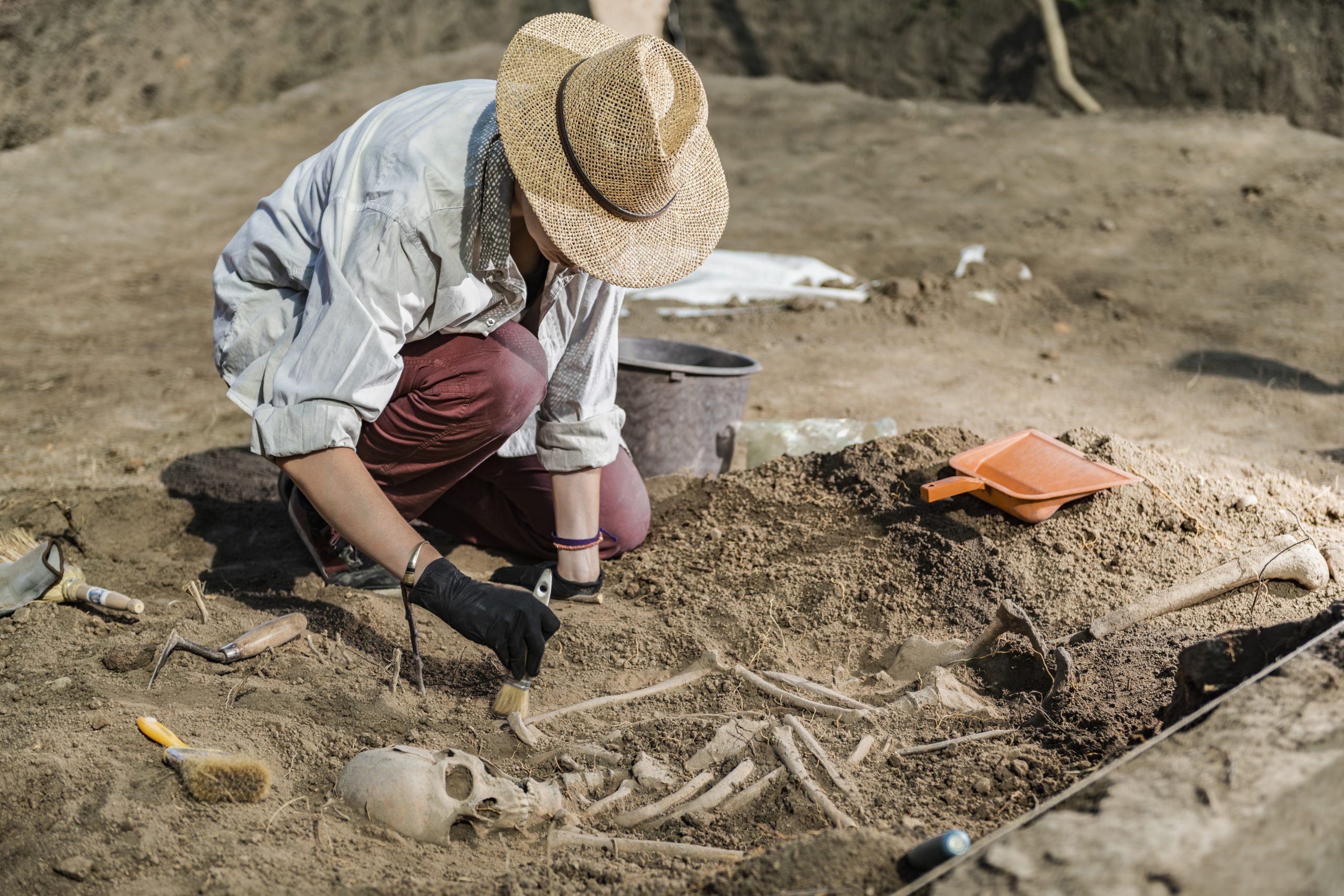Welcome to Open Learning College – Change your career, Increase your salary, and Improve your life.
 Course Overview
Course Overview
Embark on a transformative learning journey with the UK’s most innovative home study provider, offering courses designed to unlock your true potential and facilitate the career change you desire. Access our distance learning courses directly from anywhere, anytime, and acquire industry-recognised Professional Qualifications essential for advancing in your career.
Specifically, explore the flexible and convenient Archaeology Roman Britain (Level 3) course, an ideal way to gain a diploma qualification. Whether you aim for further education, improved job prospects, or expanded knowledge, this comprehensive course allows you to prepare thoroughly for exams or careers through home study. Plus, it’s structured to be accessible and beneficial even if you have no prior knowledge in Archaeology.
Archaeology is a fascinating field that offers invaluable insights into our past, allowing us to piece together the puzzle of ancient civilisations and understand how they shaped the world we live in today. In a world dominated by modern technology, archaeology remains one of the primary means through which we can explore and learn about historical societies that predate written records. By studying artifacts, structures, and other material remains left behind by past cultures, archaeologists can reconstruct aspects of daily life, social structures, belief systems, and more.
This course serves as a comprehensive introduction to the field of archaeology, covering its definition, methodologies, and analytical techniques. Students will delve into the various methods used in archaeological research, from excavation and surveying to artifact analysis and interpretation. By understanding how archaeological evidence is gathered and analysed, students develop critical thinking skills and learn to evaluate historical sources with a discerning eye.
One of the highlights of this course is its focus on the archaeology and history of Britain, spanning from the Late Iron Age to the Roman period. Students will explore key archaeological sites and discoveries within the British Isles, gaining a deeper understanding of the region’s rich cultural heritage and its interactions with the broader Roman Empire. By examining the material culture of ancient Britons and Romans, students can reconstruct aspects of their daily lives, including their social structures, economic activities, and religious beliefs.
Moreover, this course not only offers a window into the past but also provides valuable skills that are applicable in various professional settings. Through research projects, students learn to gather and analyse data, formulate research questions, and present their findings effectively. These skills are highly transferable and can be utilised in fields such as education, heritage management, museum curation, and more. Whether students are pursuing further studies in archaeology or seeking to apply their knowledge in other disciplines, this course equips them with a solid foundation in archaeological theory and practice.
 Course Key Topics
Course Key Topics
the Archaeology Roman Britain (Level 3) course is divided into 10 modules.
Module 1: Iron Age Britain
This module introduces the Diploma course and presents the history of the island of Britain in the Late Iron Age before and after the invasions of Caesar in the 50s BC. It begins with an introduction to the discipline of Archaeology which began in the late 19th century (although people, even Kings, have been digging up sites for much longer), and links to how literary sources are used in the study of Roman Britain. Archaeology is often linked to Anthropology, the study of people. The peoples and tribes of Pre-Roman Britain are introduced along with the principles of Archaeology. The development of archaeology and the most common types of archaeological evidence as well as the processes used to investigate this is explored. The Romans dramatically changed the way life in Britain was administered and so this period continues to be studied, and knowledge is advanced as new scientific techniques emerges to help locate new Roman sites and better analyse artefacts in old sites.
Module 2: The conquest of Roman Britain AD 43-117 (Archaeological reconnaissance)
The second module examines the techniques used in archaeology such as how to locate sites, aerial photography, surveys, field walking and sampling. Initially sites were mainly based in cities, but later many rural sites were excavated, often found when building or construction work located them. Using literary and archaeological evidence derived from forts, it is possible to trace the progress of the Roman army across Britain as well as resistance to the Romans by leaders such as Caratacus and Boudicca. The invasion of Britain by the Romans and the conquest of the island until the death of the Emperor Trajan is investigated chronologically and in detail.
Module 3: Excavating Roman Britain AD 117-221
Continuing with the theme of how to carry out archaeology, excavation processes is discussed in terms of how and why it is carried out since it is an expensive and destructive process. In the past, land was simply dug, rather than being carefully excavated, as the usefulness of the discoveries became known. Then the techniques were refined and carried out methodologically and judiciously. Layers or ‘strata’ provide a timeline of history and the rules of stratigraphy are essential for successful excavations since they provide an order of the finds. Throughout the course, historical overview of Roman Britain is continued, and in this section up to AD211 examining the reigns of Hadrian through to Septimius Severus. The famous landmark of Northern Britain, Hadrian’s Wall, holds great interest, so is explored in some detail, as well as demonstrating the resistance of the north to the Roman invasion.
Module 4: Government of Roman Britain (What survives in the Archaeological Record?)
One of the key influences of the Romans was the way they brought construction, organisational systems, new methods of planning, governance, finance and structure, e.g. extensive road systems in towns and villages. Thus, how the Romans managed to govern the island of Britain through its offices such as the Governors and Procurators; Client rulers as well as taxation and security measures taken to ensure that the province was run effectively is explored. The module also explores why some artefacts and features survive in the archaeological record and others do not. What survives and what factors determine what survives in the archaeological records include issues such as climate, human activity and what is chosen to be preserved and what is burnt or destroyed e.g. in war (but this in itself can preserve the site leaving carbonised remains as evidence of a burned-out village).
Module 5: The Roman Army in Britain
This module examines the Roman army in Britain; its role, its organisation as well as some of the military installations and the role in maintaining the Emperor as an Autocrat with power, prestige and position. Throughout the occupation of Britain, the Roman army changed in its role and structure in order to meet the challenges it faced e.g. as they became better organised they developed granaries and latrines that improved the health of the soldiers. The module also examines the role of geophysical surveying methods and the variety of tools used to undertake more precise surveys to identify excavations with precise structures, the best possible finds and results of past life.
Module 6: Rural Roman Britain – post-excavation analysis
Initially archaeology focused on Roman villas owned by the very rich and influential with most of excavations having been carried out on them, and yet very few people inhabited such structures. A case study of villas is, therefore, shown here. The majority of people in Roman Britain lived in village homesteads. It will take years to redress the number of excavations to balance the number of town studies to get a more equitable understanding of how the majority of people lived during this time. The rural aspects of Britain through the 1st to 5th century, and the pre-Roman settlements that continued throughout the Roman period are studied here. They call into question just how much Britain changed under the Romans when the majority of the population lived lives relatively unchanged from before the invasion. The module also examines how archaeologists scientifically examine excavated materials once they have been retrieved, and post-excavation analyses as well as techniques used to examine organic material such as bone or animal and human remains.
Module 7: Dating and Urban centres in Roman Britain
Britain was predominantly rural prior to the arrival of the Romans who established urban centres. These centres had distinct characteristics and helped establish a formalised administrative and economy for Roman Britain. The Romans introduced formalised settlements on a scale never before perceived by the inhabitants of Britain. This module will examine the various kinds of settlement established by the Romans and will explore the reasons behind establishing these settlements. The methods used by Rome to ‘Romanise’ Britain is explored, e.g. by building an extensive road system, trade was attracted to the towns and villagers could get a better income. The principle dating methods used by archaeologists from those that can determine a relative date for a site or find, to absolute dating methods is considered. The value of biological material from pollen to the different layers of soil and what they contained was of great value in these dating methods.
Module 8: Trade, Exchange and communication in Roman Britain
As facilities, trade and economy improved, so the resources obtained and global movement also improved. The Roman army was involved in extending and expanding the number and types of products from gold, corn, cattle and iron to greater range of metals including silver and lead, semi-precious stones, salt, stone and ceramics. Coal was relatively unknown to the Romans so the introduction of this material was valuable to them. This module will place Britain in the context of the wider Roman Empire and explore the villa economies and economic settlements established by the Romans.
Module 9: Understanding Religion and Ritual in Roman Britain
Archaeologists use key concepts in anthropology and sociology to explore and explain the beliefs, rituals and religion by exploring the religious and ritual sites (e.g. towers, sacrificial slabs, altars, temples with finds of religious vessels and instruments) of Britain during the Roman period. To what extent did the Romans introduce new religions into Britain (including cults and Eastern influences) and to what extent did they preserved and adapt to pre-Roman gods. The various ritual centres and structures as well as objects are explored in the UK to gain a wider understanding of the Roman Empire. The examination of religion is particularly valuable in the study of archaeology as it enables us to try to understand how people thought, were like and behaved in the past.
Module 10: The end of Roman Britain? Interpreting Archaeology
In summarising the course, we return to completing the chronology begun in earlier chapters. What caused the end of the Roman occupation of Britain and elsewhere, who else invaded the Island (the Gaul and Saxons as well as local invasions from the north of UK) and how this influence the changes to the economy and the way the country was administered. To this end it is important to consider Britain in the wider context of the Roman Empire, what different views explain the cause of the changes in the late eras, and the various challenges faced causing it to separate and return to the central administration. There were always some who did not succumb to the Roman Empire and difficulties with these people grew in later years. The module will also consider how archaeological evidence is presented to the public and why interpretations of this evidence can change as accurate techniques formed.
(Please click on the curriculum tab above to see a detailed view of each module)
Course Content
Archaeology Roman Britain (Level 3) – FREE Starter Pack
How to…. (a series of explainer videos)
Module 1 – Iron Age Britain
Module 2 – The conquest of Roman Britain AD 43-117 (Archaeological reconnaissance)
Module 3 – Excavating Roman Britain AD 117-221
Module 4 – Government of Roman Britain (What survives in the Archaeological Record?)
Module 5 – The Roman Army in Britain
Module 6 – Rural Roman Britain – post-excavation analysis
Module 7 – Dating and Urban centres in Roman Britain
Module 8 – Trade, Exchange and communication in Roman Britain
Module 9 – Understanding Religion and Ritual in Roman Britain
Module 10 – The end of Roman Britain? Interpreting Archaeology
Course Resources
Final Exam
College Announcements
🔍 Unlock the Mysteries of Roman Britain with £50 OFF the Archaeology Roman Britain (Level 3) Course! 🏛️🔍
Ready to embark on an archaeological journey through the captivating history of Roman Britain? For a limited time only, we're excited to offer you an exclusive discount of £50 off our Archaeology Roman Britain (Level 3) course!
Use code ROMAN50 at checkout before the month ends!
👣 Why Choose Our Archaeology Roman Britain Course
The Archaeology Roman Britain course, presented by Open Learning College, is your passport to uncovering the secrets of one of the most intriguing periods in British history. Dive deep into the fascinating world of Roman occupation and its impact on Britain through 10 comprehensive modules. Explore the Roman conquest, governance, military presence, urbanization, trade networks, religious practices, and much more.
💪 What Makes Our Course Shine
Flexibility: Study at your own pace and convenience, with 24/7 access to course materials.
Comprehensive Support: Receive guidance from experienced tutors who are passionate about archaeology and Roman history.
Real-World Insights: Gain practical skills in archaeological methods and historical analysis, preparing you for further study or a career in archaeology.
Don't miss out on this chance to unravel the mysteries of Roman Britain at a discounted rate! Enroll now, use code ROMAN50* at checkout, and embark on your journey to becoming an expert in Roman archaeology. 🏺📜
*This discount code cannot be combined with any other offer.









 Get Social!
Get Social!











Daniel Evans.